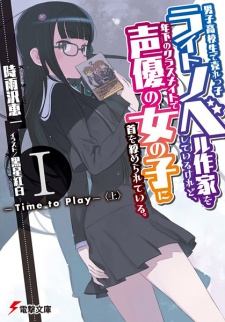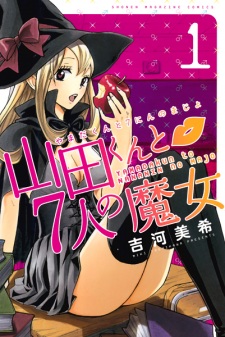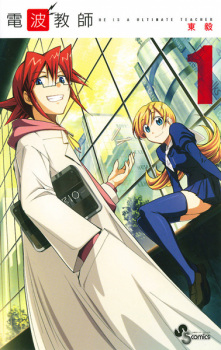Sep 21, 2015
---This is a spoiler-free review---
“What exactly is the enemy?
History? People? Common sense?
Or is it all of them?“ - Owari no Chronicle 1-A
Stories where a hero and his ragtag group of friends save the world from certain doom are dime-a-dozen. What is not so common is for this to be done by a self-proclaimed villain, working for a corporation responsible for destroying several other worlds, by the way of negotiating with the survivors of those worlds over the sins of his predecessors, all the while discovering that everything he took for a fact was a lie. Oh, and there's also lots of mechanical dragons,
...
which might just be the coolest thing ever invented.
Owari no Chronicle is a story which is hard to put in a genre. On one hand, it could be described as a sci-fi series filled with fantasy elements, on the other, one could view it as an urban fantasy story with technobabble. This type of science-fantasy story, typical for the author at hand, lets Minoru Kawakami bring influences from every mythology together with the technology of the future, allowing witches to fight alongside advanced androids. Far from clashing stylistically, this really works in the series favor. The reimagining of beings like Aztec gods and Greek monsters into one of the aforementioned gigantic flying mechanical dragons and unimaginely powerful robots, coupled with the fact that the author seems to have actually put effort into his research instead of just throwing in whatever sounds cool, gives the series a sense of being both well thought-through and original.
These qualities also extend to the rest of the setting. The general workings of the so called Gears, the separate worlds that made up the universe prior to the Concept War, and the Concepts, the physical laws of each Gear, are well defined to the extent where they are almost believable. Some of the more esoteric uses and effects of the Concepts might strain the suspension of disbelief of some readers, but the foundation they stand on is solid enough that nothing seems drawn out of thin air. Every Gear is unique and brings something new to the table, and through glimpses of the past and stories from survivors, they help bring the sense of scale to something bigger than just the Earth. Most importantly, the fact that the setting and plot are so intertwined gives the setting lots of context and the plot lots of flare.
As for the plot itself, it starts out relatively simple: Mikoto Sayama has received the mission to bridge relations with the survivors of ten different worlds by the agency that destroyed them or the world ends. This is the mission referred to as the Leviathan Road. Piece of cake. However, as other factions take the stage, the problems get infinitely more complex. Obstacles to the Leviathan Road appear from all possible directions, and the path forward is shrouded by old mysteries and dark conspiracies, forcing the protagonists to dive deep into examining a past that is everything but pleasant. All the while, Mikoto plays his part in a love story that is far from simple. For most parts, these story elements are well conceived, though at times the way things unfold seem far too contrived to be believable, for the purpose of dramatic effect.
The series features a diverse set of main characters, most of which are developed over the course of the story, and almost all of which have an arc where they have the chance to shine. The only noteable exception to this is Kaku Izumo who has most of his character development take place before the series begins, and as a result comes off as a character with less depth than the other protagonists. Main characters aside, the series also features a rich cast of unique side characters who all play important roles in bringing the story forward. The interactions between all these characters bring a lot of humor to the story, with Mikoto in particular leaving me laughing out loud at times. Though sometimes crude, it always helps to brighten the mood in what might otherwise be a really dark story.
If I were to mention something about the art, it would be that it improves greatly over the course of the series. The first couple of volumes have some wonky anatomy and colouring, but as it passes the halfway point most of the oddities have been evened out. Overall, the art is average, although more pictures of more complex structures like the mecha or mechanical dragons would have been nice.
My personal opinion on this series is that it's a must read for anyone that wants to be absorbed by a story that has everything a story should: novel ideas, interesting characters, relateable love stories, depths of despair, heights of hope, unforseen turns and twists and a whole lot of cool stuff. It's a trip, and when you get into it you'll blaze through the seven volumes in no time. I have followed the English translation of the series since it began, and now, when those translations have reached their end, I feel envy at anyone reading this who still hasn't begun to go through the series. It has its ups and downs (there have been times when I cringed at how corny and 'videogamey' certain scenes were, and the first part of volume 2 was pretty uneventful), but overall I'd say that picking up and sticking with this series was one of the best entertainment-related choices of my life.
Overall, Owari no Chronicle is a really solid series of novels, and definitely something to pick up for anyone who loves an intriguing story in an original setting. It has a nice cast of characters and lots of humor, which it uses to balance the omnious atmosphere that comes with a looming apocalypse. Despite some flaws, the Owari no Chronicle experience is one hell of a ride and something you won't regret starting.
Reviewer’s Rating: 9
What did you think of this review?
Nice
 0
0
Love it
 0
0
Funny
 0
0
Confusing
 0
0
Well-written
 0
0
Creative
 0
0Show all



























